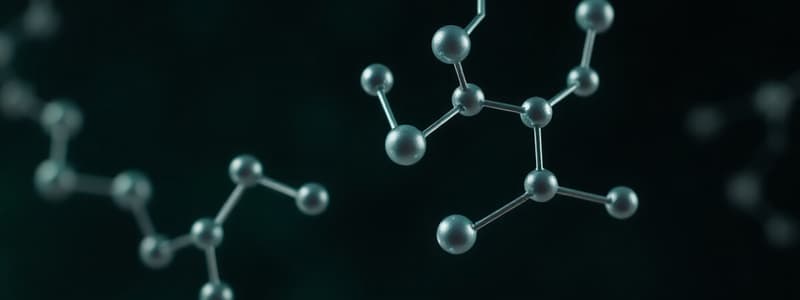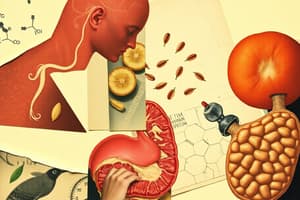Podcast
Questions and Answers
What distinguishes essential amino acids from non-essential amino acids?
What distinguishes essential amino acids from non-essential amino acids?
- Essential amino acids can be synthesized in the body.
- Non-essential amino acids are always present in high amounts in foods.
- Essential amino acids cannot be synthesized in the body. (correct)
- Non-essential amino acids must be obtained from the diet.
Which of the following describes glucogenic amino acids?
Which of the following describes glucogenic amino acids?
- They can be converted into glucose. (correct)
- They are primarily used for protein synthesis.
- They can only be converted into ketone bodies.
- They are only found in plant-based sources.
What is a common consequence of methionine breakdown in the body?
What is a common consequence of methionine breakdown in the body?
- It produces a risk factor for heart disease due to homocysteine. (correct)
- It is the primary source of energy during fasting.
- It generates ammonia as a metabolic byproduct.
- It leads to an increase in essential amino acids.
What role do amino acids primarily play in energy metabolism?
What role do amino acids primarily play in energy metabolism?
What is phenylketonuria (PKU) primarily caused by?
What is phenylketonuria (PKU) primarily caused by?
Which type of amino acids can lead to the formation of glucose?
Which type of amino acids can lead to the formation of glucose?
What is a characteristic of ketogenic amino acids?
What is a characteristic of ketogenic amino acids?
Which of the following amino acids is an example of a glucogenic amino acid?
Which of the following amino acids is an example of a glucogenic amino acid?
What metabolic intermediate is NOT associated with glucogenic amino acids?
What metabolic intermediate is NOT associated with glucogenic amino acids?
Which condition is associated with a genetic defect in amino acid metabolism?
Which condition is associated with a genetic defect in amino acid metabolism?
What is a potential risk associated with methionine breakdown?
What is a potential risk associated with methionine breakdown?
What is the significance of sufficient amino acids in nutrition?
What is the significance of sufficient amino acids in nutrition?
What does the breakdown of amino acids generate that can lead to toxicity?
What does the breakdown of amino acids generate that can lead to toxicity?
What condition is characterized by the deposition of dark pigment on vertebrae?
What condition is characterized by the deposition of dark pigment on vertebrae?
Which vitamin deficiency can lead to elevated homocysteine levels?
Which vitamin deficiency can lead to elevated homocysteine levels?
What is a potential consequence of elevated levels of homocysteine?
What is a potential consequence of elevated levels of homocysteine?
Which genetic defect is associated with the metabolism of methionine?
Which genetic defect is associated with the metabolism of methionine?
What amino acid is a direct precursor to homocysteine?
What amino acid is a direct precursor to homocysteine?
Which of the following is NOT a consequence of high homocysteine levels?
Which of the following is NOT a consequence of high homocysteine levels?
What is the role of Vitamins B12 and folate in homocysteine metabolism?
What is the role of Vitamins B12 and folate in homocysteine metabolism?
Which of the following statements is true regarding elevated homocysteine levels?
Which of the following statements is true regarding elevated homocysteine levels?
What is the primary enzyme that is defective in Phenylketonuria (PKU)?
What is the primary enzyme that is defective in Phenylketonuria (PKU)?
Which symptom is commonly associated with untreated PKU?
Which symptom is commonly associated with untreated PKU?
What change occurs in the diet of patients with Phenylketonuria?
What change occurs in the diet of patients with Phenylketonuria?
What genetic mutation is involved in Phenylketonuria?
What genetic mutation is involved in Phenylketonuria?
What is the result of a defective homogentisate oxidase?
What is the result of a defective homogentisate oxidase?
What happens to IQ scores if a low phenylalanine diet is discontinued in PKU patients?
What happens to IQ scores if a low phenylalanine diet is discontinued in PKU patients?
What is the primary clinical symptom of alkaptonuria?
What is the primary clinical symptom of alkaptonuria?
What is a notable feature of the new drug Palynziq for PKU patients?
What is a notable feature of the new drug Palynziq for PKU patients?
Under what condition are amino acids predominantly used as fuel during starvation?
Under what condition are amino acids predominantly used as fuel during starvation?
What is the main purpose of transaminase enzymes in amino acid metabolism?
What is the main purpose of transaminase enzymes in amino acid metabolism?
What does the carbon skeleton of the amino acid alanine produce after transamination?
What does the carbon skeleton of the amino acid alanine produce after transamination?
Which vitamin derivative acts as a cofactor for transaminases?
Which vitamin derivative acts as a cofactor for transaminases?
What is the percentage of energy needs that typically comes from amino acids?
What is the percentage of energy needs that typically comes from amino acids?
What is a potential consequence of measuring transaminase activity in serum?
What is a potential consequence of measuring transaminase activity in serum?
Which of the following metabolites produced from amino acids does NOT enter the TCA cycle?
Which of the following metabolites produced from amino acids does NOT enter the TCA cycle?
What is the end product of oxidative deamination during amino acid metabolism?
What is the end product of oxidative deamination during amino acid metabolism?
Flashcards
Essential Amino Acids
Essential Amino Acids
Amino acids that the body cannot synthesize and must be obtained from the diet.
Non-Essential Amino Acids
Non-Essential Amino Acids
Amino acids that the body can synthesize from other molecules.
Glucogenic Amino Acids
Glucogenic Amino Acids
Amino acids that can be converted into glucose through metabolic pathways.
Ketogenic Amino Acids
Ketogenic Amino Acids
Signup and view all the flashcards
Amino Acid Catabolism
Amino Acid Catabolism
Signup and view all the flashcards
Amino Acid Degradation
Amino Acid Degradation
Signup and view all the flashcards
Transamination
Transamination
Signup and view all the flashcards
Oxidative Deamination
Oxidative Deamination
Signup and view all the flashcards
Urea Cycle
Urea Cycle
Signup and view all the flashcards
Aspartate Transaminase (AST)
Aspartate Transaminase (AST)
Signup and view all the flashcards
Alanine Transaminase (ALT)
Alanine Transaminase (ALT)
Signup and view all the flashcards
Pyridoxal Phosphate
Pyridoxal Phosphate
Signup and view all the flashcards
Carbon Skeleton
Carbon Skeleton
Signup and view all the flashcards
What is the role of pyruvate in amino acid metabolism?
What is the role of pyruvate in amino acid metabolism?
Signup and view all the flashcards
What is the role of acetyl-CoA in amino acid metabolism?
What is the role of acetyl-CoA in amino acid metabolism?
Signup and view all the flashcards
What is the connection between homocysteine and heart disease?
What is the connection between homocysteine and heart disease?
Signup and view all the flashcards
How is ammonia dealt with in the body?
How is ammonia dealt with in the body?
Signup and view all the flashcards
What is the importance of amino acids in nutrition?
What is the importance of amino acids in nutrition?
Signup and view all the flashcards
Phenylketonuria (PKU)
Phenylketonuria (PKU)
Signup and view all the flashcards
Phenylalanine Hydroxylase
Phenylalanine Hydroxylase
Signup and view all the flashcards
Alkaptonuria
Alkaptonuria
Signup and view all the flashcards
Homogentisate Oxidase
Homogentisate Oxidase
Signup and view all the flashcards
Maternal PKU
Maternal PKU
Signup and view all the flashcards
Low Phenylalanine Diet
Low Phenylalanine Diet
Signup and view all the flashcards
Palynziq (Pegunigranib)
Palynziq (Pegunigranib)
Signup and view all the flashcards
Tyrosine: Essential in PKU
Tyrosine: Essential in PKU
Signup and view all the flashcards
Homocystinuria
Homocystinuria
Signup and view all the flashcards
Homocysteine
Homocysteine
Signup and view all the flashcards
Cystathionine synthase
Cystathionine synthase
Signup and view all the flashcards
Vitamin B6, B12, and folate
Vitamin B6, B12, and folate
Signup and view all the flashcards
Elevated homocysteine: Risk factor for heart disease
Elevated homocysteine: Risk factor for heart disease
Signup and view all the flashcards
Homocysteine: Derived from methionine
Homocysteine: Derived from methionine
Signup and view all the flashcards
Homocysteine: Conversion pathways
Homocysteine: Conversion pathways
Signup and view all the flashcards
Study Notes
Amino Acid Metabolism
- Amino acids are categorized as essential or non-essential
- Essential amino acids must be obtained from the diet, while non-essential amino acids can be synthesized by the body.
- Amino acids can be used as energy sources.
- Some amino acids are glucogenic (converted to glucose), others are ketogenic (converted to ketone bodies).
- Amino acid degradation (catabolism) involves transamination and oxidative deamination to remove the amino group.
- The resulting nitrogen is converted to urea and excreted, while the carbon skeleton enters the TCA cycle.
- Pyridoxal phosphate is an essential cofactor for transaminases which transfer amino groups.
- Transaminases are enzymes involved in amino acid degradation and are useful clinical markers of tissue damage.
- Genetic defects in amino acid metabolism can lead to serious diseases, with phenylketonuria (PKU) being a common example, particularly in Ireland.
- Methionine breakdown can produce homocysteine, a risk factor for heart disease.
- Amino acid breakdown generates ammonia and urea.
- Adequate intake of amino acids is crucial for health, even more so in cases of disease.
- Amino acids can't be stored long term in the body.
Amino Acid Structure
- Amino acids have a central carbon atom (α-carbon) bonded to an amino group (NH₃⁺), a carboxyl group (COO⁻), a hydrogen atom, and a variable R-group (side chain).
- This R-group differentiates the various amino acids.
- Examples of amino acids mentioned are Serine (Ser, S), Alanine (Ala, A), Phenylalanine (Phe, F) and Leucine (Leu, L).
Essential and Nonessential Amino Acids
- Histidine, Isoleucine, Leucine, Lysine, Methionine, Phenylalanine, Threonine, Tryptophan, and Valine are essential amino acids.
- Alanine, Arginine, Asparagine, Aspartate, Cysteine, Glutamate, Glutamine, Glycine, Proline, Serine, and Tyrosine are nonessential amino acids.
- Beans are low in methionine, and many cereal crops are very low in lysine.
Examples of Importance of Amino Acid Metabolism in Medicine
- Genetic defects in amino acid metabolism lead to various medical conditions, e.g. phenylketonuria (PKU).
- Elevated homocysteine levels are a risk factor for heart disease.
- Amino acid degradation generates ammonia and urea; toxicity can result from a build-up.
- Nutritional factors, and the need for adequate amino acids are important in health and in disease.
Amino Acid Degradation (Catabolism)
- Amino acids are degraded under three metabolic conditions following protein-rich meal ingestion, cellular protein turnover and starvation.
- Amino acid degradation involves removing the amino group to generate energy or to convert to glucose or ketone bodies.
- The carbon skeleton of amino acids enters the TCA cycle.
- Transamination, and oxidative deamination are involved in removing the amino group.
Classification of Amino Acids
- Amino acids are classified as glucogenic or ketogenic based on their metabolic fate.
- Glucogenic amino acids can be converted to glucose, while ketogenic amino acids lead to the formation of ketone bodies.
- Examples of both glucogenic and ketogenic amino acids are given in a table.
Inborn Errors of Amino Acid Metabolism
- Genetic defects in amino acid metabolism can lead to deficiencies in enzyme function.
- Inborn errors of metabolism can cause a build-up of toxic metabolites, and result in severe diseases such as PKU, Homocystinuria, and Alkaptonuria.
- Disorders often cause mental retardation or other serious clinical problems.
- Some disorders are more common in certain populations.
Phenylketonuria (PKU)
- PKU is caused by a genetic defect in phenylalanine hydroxylase, resulting in the inability to convert phenylalanine to tyrosine.
- This leads to a buildup of phenylalanine and its by-products.
- PKU is often treated with a low phenylalanine diet.
- Untreated PKU can cause significant developmental problems, particularly intellectual disability.
- All newborns are screened for PKU.
Alkaptonuria
- Alkaptonuria is caused by a deficiency in homogentisate oxidase.
- This leads to accumulation of homogentisic acid.
- Symptoms include dark urine and arthritis development.
- The buildup of homogentisic acid in the body also results in the production of dark pigments in body tissue and bones.
Homocystinuria
- Homocystinuria is a genetic disorder involving elevated homocysteine levels.
- It results from defects in the enzymes responsible for converting homocysteine to cysteine or methionine.
- Deficiencies in vitamin B6, folate, or vitamin B12 can also contribute to homocysteine build-up.
- Elevated homocysteine is a risk factor for premature arterial diseases, mental retardation, ectopic lentis (displacement of the lens of the eye) and skeletal abnormalities.
Additional Notes
- Many of the listed metabolic pathways are complex and require further in-depth study to fully understand all the nuances and details.
- The use of diagrams and chemical structures to illustrate the metabolic steps is vital for understanding the process.
Studying That Suits You
Use AI to generate personalized quizzes and flashcards to suit your learning preferences.



